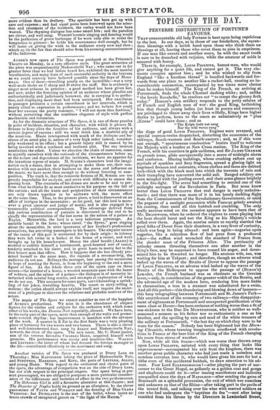AUBER'S new opera of The Syren was produced at the
Princess's Theatre on Monday, in a very effective style. The great attraction of the piece was unquestionably Mademoiselle Neu; who came out in far greater force than we had before heard her, exhibited the most tasteful vocalization, and many feats of such successful audacity in the bravura as we could scarcely have believed possible since the days of MALI- BRAN. One of these—trenching nearly on the incredible—was a very well-made shake on C sharp and D above the staff. She is evidently a singer most arduous in practice : a good method has been given her, and now, under the fostering opinion of an audience whose plaudits are enthusiastically and judiciously bestowed, she is carrying it to perfec- tion, and displaying more than had been anticipated. Her excellence in passages produces a certain smoothness in her intervals, which is nearly allied to expression in performance ; and we believe few could bear her execute the pretty romance, " I will not deem thee faultless," without perceiving that she combines elegance of style with perfect mechanism and intonation.
As for the dramatic structure of The Syren, it is one of those puzzles in point of incident, situation, and character, with which it pleases M. SCRIBE to keep alive the faculties of his audience, and always with a certain degree of success : still we must think him a doubttul ally of the musician. Music interspersed with much of the dialogue and bu- siness of an acted play is, unless of a very high order indeed, consider- ably weakened in its effect ; but a greater injury still is caused by its being involved with a confused and intricate plot. The one interest neutralizes the other. Unless we abandon the chain of causation, cease to mystify ourselves with the rationale of the circumstances before us, or the nature and dependence of the incidents, we have no appetite for the luxurious repose of music. M. SCRIBE'S characters lead the imagi- nation such a dance, that in attempting to make them out, their con- nexion with one another, their business on the scene and influence on the music, we have more than enough to do without listening to com- position. The truth is, that the romantic fictions of M. SCRIBE are too grossly improbable for analysis, and serve with difficulty to amuse the passing hour. The creatures of his drama are made to be and to per- form what he thinks fit as most conducive to his purpose on the fall of the curtain ; and all the knots and perplexities of their circumstances are only drawn together to be undrawn with the more effect at the same time. Thus, in the present piece, a lord is discovered on an affair of intrigue in the mountains : so far good, but this lord is more- over a great amateur and judge of music, and is also engaged in a —treasonable political correspondence. The advantage derived from this eurious combination of pursuits is discovered in the end to be chiefly the representation of the last scene in the saloon of a palace at Naples:- Meanwhile, the lord is a very ludicrous personage. An amiable bandit is the hero ; whose sister, "the Syren," goes singing about the mountains, in utter ignorance of her brother's professional avocations, but attracting passengers to his haunts. The singular nature of the tastes of this pair is accounted for by their origin : in infancy they were left twins in a basket at the house of a rector, and were brought up by his housekeeper. Hence the chief bandit (ALLEN) is enabled to exhibit himself a sentimental, good-hearted sort of rascal, tenderly attached to his sister, and in great baste to marry her to the first honest man that offers. How it happens that she has already pro- mised herself to the same man, the captain of a revenue-brig, the audience do not see. Bolbaya the manager, lost among the mountains in hope of meeting the Syren, is from the beginning to the end a mere figure of fun. As the whole three acts of the opera pass on three scenes—the interior of a house, a wooded mountain-pass with the haunt of robbers, and the saloon of a palace—the dialogue is of necessity in- terlarded with several long stories, and attempts at explanation of what we do not see. This accounts for some parts, notwithstanding a sprink- ling of fair jokes, travelling heavily. The resort to story-telling is tedious : the action should always explain itself, nor require the assist- ance of a prologue to discover the relations and probable motives of the actors.
The music of The Syren we cannot consider as one of the happiest of AUBER'S prcductions. We miss in it the abundance of elegant figures for the violins and subjects for the orchestra with which some other of his works, the Domino Noir especially, abound. We have here, in the early part of the opera, more than enough of the waltz and prome- nade-concert rhythm : but improvement is manifest with the advance of the work. A quartet in E flat in the first finale was a very pleasing piece of harmony for two tenors and two basses. There is also a clever and well-instrumented duet, sting by ALLEN and Mademoiselle Neu, towards the close of the opera. The new tenor, Mr. C. HORN junior, on of the veteran favourite CFIARLES Hons., acquitted himself with promise. His performance was steady and musician-like. WALTON and LEFFLER—the latter of whom had dressed the foreign manager to the life—contributed effectively to the merriment and song.


























 Previous page
Previous page